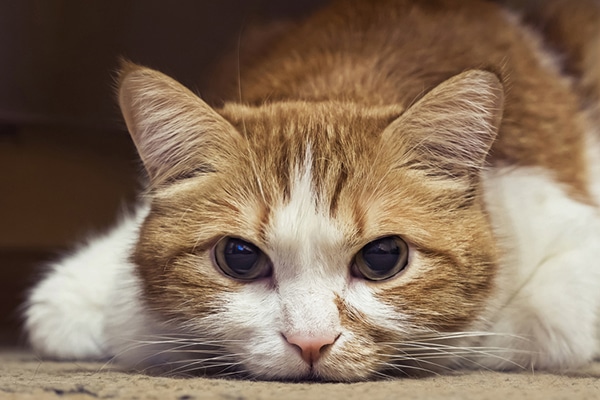Even a perfectly healthy cat will vomit from time to time, so cat vomiting shouldn’t be an automatic cause for alarm. You may even find your cat throwing up hairballs on an occasional basis, especially if your kitty is a fastidious groomer. However, a cat vomiting blood is a different story.
Normal Cat Vomiting vs. a Cat Vomiting Blood

“A lot of cats vomit on occasion,” says Richard E. Goldstein, DVM, DACVIM, of the Animal Medical Center in NYC. “But I don’t think a cat owner should tolerate it at all — certainly not if it occurs more than once a week.”
One symptom that can accompany cat vomiting — and should raise serious concern for all cat owners — is a cat vomiting blood. This warrants a trip to your veterinarian immediately because it could mean that your cat is suffering from a potentially life-threatening health problem. This is especially true if the vomiting has persisted for more than three days.
A cat vomiting blood (called ‘hematemesis’), is a sign of a gastrointestinal disorder or some other form of bleeding. The blood may be either bright red and streaky, or dark in color like coffee grounds. Regardless of the appearance, a cat vomiting blood is a situation that must be taken seriously. Your veterinarian will give your cat a thorough examination and may run tests to identify the issue.
Symptoms of a Cat Vomiting Blood
If you notice your cat vomiting blood, and the blood in question is bright red, that means it’s fresh and may have been caused by trauma to the esophagus, such as an oral health condition or even swallowing a foreign object. A cat vomiting blood that’s dark may indicate issues taking place lower in the cat’s digestive tract.
Common symptoms that accompany a cat vomiting blood include:
- loss of appetite
- dehydration
- weakness or lethargy
- pawing at the mouth or teeth
- diarrhea
- black stool or blood present in the stool
- shallow breathing
- signs of anemia
- signs of depression
- pain or fever
- seizures
Why is my Cat Vomiting Blood?
Possible reasons for a cat vomiting blood include —
- an adverse reaction to medication
- gingivitis
- trauma to the esophagus
- ulcers in the gastrointestinal tract or esophagus
- respiratory disease
- certain cancers (particularly if tumors are bleeding)
- blood clotting conditions
Diagnosing a Cat Vomiting Blood
During the physical examination and any necessary diagnostic tests, your vet will be able to determine the reasons behind a cat vomiting blood — and also the best treatment protocol.
The veterinarian will likely analyze your cat’s blood and urine, in addition to performing an endoscopy, ultrasound, and/or X-rays. If cancer is suspected, the vet may take a biopsy of the gastrointestinal tract. Unless it’s specifically requested, you don’t need to bring a sample of vomit or stool to the veterinary clinic. Vets cannot effectively test vomit samples for disease and other conditions, so these likely won’t be helpful.
Treatment for a Cat Vomiting Blood
Obviously, treatment is dependent on the underlying cause of the cat vomiting blood. In many cases of a cat vomiting of blood because of disease, treatment may sometimes need to be more aggressive. However, other diseases may be managed by drug therapy. Brief hospitalization and intravenous fluid therapy may potentially be required to restore electrolytes and fluids lost during vomiting.
If the bleeding is caused by ulcers, the veterinarian may prescribe medication that will help prevent the ulcer from causing any more harm to the lining of the stomach and reduce the acidity of the stomach environment. A special diet is usually recommended. Surgery is another method of treatment for ulcers, which will require an endoscopy beforehand. Your vet will schedule a follow-up appointment to monitor the ulcers through endoscopy.
If the reason behind a cat vomiting blood is cancer, treatment methods may include surgery, chemotherapy or radiation treatment — depending on the location and stage of the cancer. Your vet will discuss the different options based on your cat’s specific needs.
Prognosis and Recovery for a Cat Vomiting Blood
Ultimately, the prognosis and recovery for a cat vomiting blood will vary based on the underlying cause and the recommended course of treatment. Be sure to follow all of your vet’s treatment and recovery instructions carefully. For instance, if your cat has been diagnosed with gingivitis, you will need to ensure that you take proper care of your cat’s teeth by brushing them each day. Your vet will be able to advise you on a dental care regimen.
If your cat has been prescribed drug therapy to treat gastrointestinal ulcers, it is imperative that you administer the medication for the entire duration of the recommended treatment period — even if symptoms start to clear up. Failure to do so could result in aggressive recurrence. If your cat has had surgery, make sure that he does not irritate the surgery site. After any major operation or procedure, you’ll need to provide a warm, safe place for your cat to rest. Your vet will be able to advise you on dietary changes, if necessary.
Thumbnail: Photography © Vladdeep | iStock / Getty Images Plus.
Writer Elizabeth Vecsi lives in the Hudson Valley with her five cats. Over the past two decades, she has been an editor and writer for The Whole Cat Journal, Cornell’s CatWatch and Tufts’ Catnip.
Read more about cat health and care on Catster.com:
- What to Feed a Cat Who’s Vomiting
- Hemp Benefits — 6 Hemp Products to Help Keep Your Cat Healthy
- How Long Are Cats Pregnant? The 5 Stages of Cat Pregnancy
- 1 Normal Cat Vomiting vs. a Cat Vomiting Blood
- 2 Symptoms of a Cat Vomiting Blood
- 3 Why is my Cat Vomiting Blood?
- 4 Diagnosing a Cat Vomiting Blood
- 5 Treatment for a Cat Vomiting Blood
- 6 Prognosis and Recovery for a Cat Vomiting Blood
- 7 About the author
- 8 Read more about cat health and care on Catster.com:





